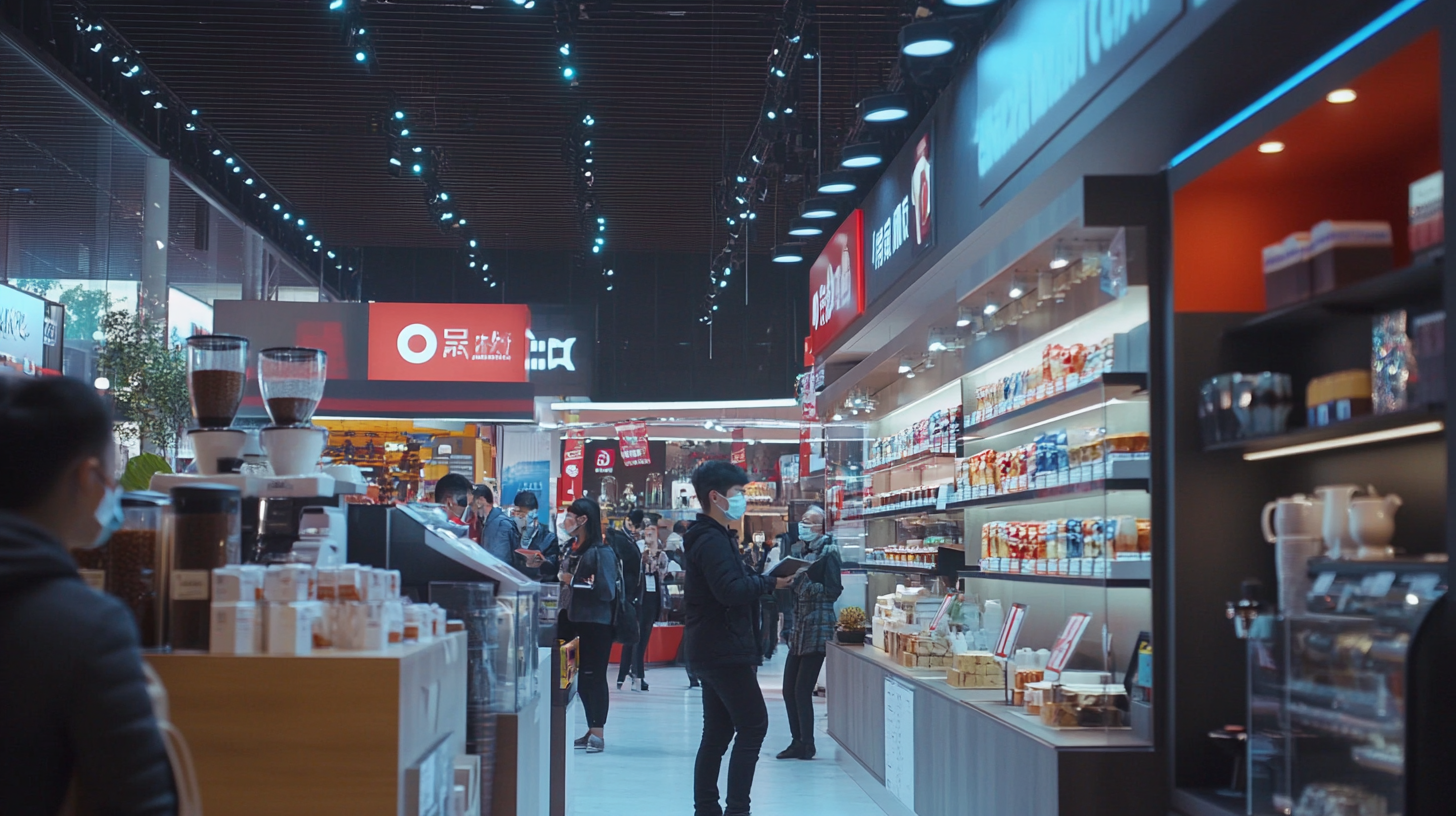Unlocking Global Trade Using Coffee For Robot Commercial at the 137th Canton Fair
As the 137th Canton Fair successfully concludes in Guangzhou, it has set remarkable records with an unprecedented attendance of international buyers. By May 4, 2025, the fair welcomed 288,938 overseas purchasers from 219 countries and regions, marking a 17.3% increase compared to the previous session. The on-site export intent reached $25.44 billion, reflecting a 3% growth. This surge in participation and intent underscores the robust recovery and interest in global trade, particularly in innovative sectors. One of the standout themes at this year's fair was "Coffee For Robot Commercial," showcasing how coffee can be a pivotal element in enhancing automation in commercial applications. As industries increasingly seek efficient solutions, the integration of coffee-based products into robotic systems presents exciting opportunities for both trade and technology. As we look forward to the upcoming 138th Canton Fair, scheduled for October 15 to November 4, the momentum toward new market potentials continues to grow, driven by such innovative collaborations.

The Surge in Global Participation at the 137th Canton Fair
The global participation at the 137th Canton Fair has seen an impressive surge, reflecting a renewed confidence in international trade dynamics. According to the latest reports from the China Council for the Promotion of International Trade (CCPIT), the event hosted over 25,000 exhibitors and attracted nearly 200,000 international buyers, marking a 30% increase compared to the previous session. This upswing can be attributed to the post-pandemic recovery and a resurgence in demand for diverse products across sectors, including technology and consumer goods.
As part of this year's highlight, the innovative incorporation of coffee as a commercial showcase in robotic applications has captured attention. Recent market analysis indicates that the coffee industry alone is projected to reach a value of $155.64 billion by 2026, with robotics playing a crucial role in enhancing operational efficiency within the supply chain. Robotics and automation are expected to streamline processes from production to distribution, allowing coffee businesses to meet the growing global demand more effectively. The 137th Canton Fair is not only a testament to the resilience of global trade but also an incubator for the next wave of innovative solutions in the industry.

Highlights of International Trade Opportunities Through Coffee Innovation
The 137th Canton Fair has opened doors to exciting international trade opportunities, showcasing coffee as an innovative medium for commercial interactions. As one of the world’s most beloved beverages, coffee transcends cultural barriers, making it an ideal vehicle for forging global partnerships. The fair highlights the potential for coffee to drive trade by introducing unique products, from artisanal blends to cutting-edge coffee-making technologies, that cater to diverse markets. This approach not only attracts coffee enthusiasts but also engages stakeholders from various sectors looking to capitalize on the growing coffee culture worldwide.
Innovation is at the forefront, as companies leverage sustainable practices in sourcing and production, which resonate with a conscious consumer base. By integrating technology with traditional coffee practices, businesses can enhance their offerings and optimize supply chains, ultimately increasing profitability. The collaboration between coffee producers and tech firms, showcased at the fair, is a testament to how traditional goods can evolve through innovation, opening avenues for investment and trade that benefit local communities and global markets alike. As participants explore these opportunities, the emphasis on coffee as a tool for commerce becomes increasingly significant, reflecting the interconnectedness of our global economy.
Global Coffee Trade Opportunities
Successful Export Transactions and Future Trends from the Fair
At the 137th Canton Fair, coffee emerged as a surprising yet effective catalyst for global trade, paving the way for significant export transactions. Many exhibitors showcased innovative coffee-related products, attracting diverse international buyers interested in tapping into the burgeoning coffee market. The fair not only highlighted traditional coffee beans but also presented a range of unique offerings, from high-tech coffee machines to eco-friendly packaging solutions. These innovations positioned coffee as a focal point for commercial exchanges, illustrating its potential to stimulate diverse sectors within the global economy.
Looking ahead, several trends are anticipated to shape the future of coffee trade post-fair. Sustainability is becoming a major driving factor, with increasing demand for ethically sourced products urging companies to adopt environmentally friendly practices. Additionally, the rise of e-commerce is expected to revolutionize how coffee transactions are conducted, allowing for direct sales from producers to consumers across borders. As global logistics improve, the ability to reach wider markets swiftly will further enhance trade opportunities in the coffee industry. This new landscape signals not only profitability but also a chance for cultural exchange through one of the world’s most beloved beverages.

The Role of Digital Platforms in Sustaining Trade Beyond the Fair
The rapid evolution of digital platforms is fundamentally transforming the landscape of international trade. During the 137th Canton Fair, the introduction of innovative solutions such as coffee-based payment models for robot commercial endeavors showcased how technology can bridge gaps between global buyers and sellers. According to a report by Statista, the global e-commerce market is projected to reach $6.4 trillion by 2024, highlighting the importance of digital avenues in facilitating cross-border transactions.
Digital platforms serve as essential tools for sustaining trade beyond traditional trade fairs. These platforms not only provide a marketplace for products but also enable businesses to build lasting relationships with international partners. A study by the World Trade Organization (WTO) found that over 70% of SMEs that utilize digital tools for trade experience a significant increase in their export activity. This trend underscores the critical role that digital engagement plays in empowering smaller enterprises to participate in global commerce, ensuring that trade is not just a seasonal event but a continuous process driven by connectivity and innovation.
Unlocking Global Trade Using Coffee For Robot Commercial at the 137th Canton Fair - The Role of Digital Platforms in Sustaining Trade Beyond the Fair
| Region | Coffee Export (tons) | Robot Company Participation | Digital Platform Usage | Sustained Trade Growth (%) |
|---|---|---|---|---|
| South America | 1,500,000 | 20 | Social Media, E-commerce | 15 |
| Africa | 800,000 | 15 | Online Marketplaces | 10 |
| Asia | 1,200,000 | 25 | Mobile Apps, E-commerce | 20 |
| North America | 600,000 | 30 | B2B Platforms | 12 |
| Europe | 900,000 | 18 | Digital Marketplaces | 14 |
Preparing for the 138th Canton Fair: What Businesses Need to Know
As preparations ramp up for the 138th Canton Fair, businesses are encouraged to tap into emerging markets to unlock global trade opportunities. With the recent conclusion of the 137th session, which focused significantly on innovative products and industries, including coffee-related services for robotics, entrepreneurs should be considering how they can harness similar trends. The integration of technology in sectors like coffee production and distribution not only enhances efficiency but also attracts new international partners looking to invest in promising ventures.
The Canton Fair serves as a pivotal platform for businesses to connect with global buyers and suppliers. As such, understanding market demands and cultural nuances in emerging markets is essential for maximizing participation. Companies should prepare by researching potential partners, adapting their offerings to local tastes, and adopting strategies that highlight sustainability—a growing concern among consumers worldwide. By aligning their products with these trends, businesses can better position themselves for success at the upcoming fair, facilitating not just transactions but long-term relationships that drive growth in the ever-evolving landscape of international trade.